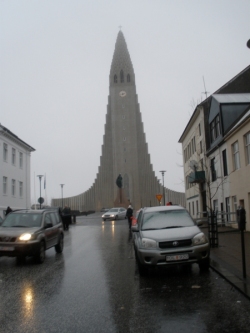January 26, 2012
Post Christendom to Missional Church
Tom Ehrich and Frank Logue are right. Christendom* ended in the early 1960s (in the USA).
My trip to Iceland helped me to see this more clearly. An island, not quite midway between Northern Europe and North America and settled in the 9th century, Icelanders share a common narrative of hardy Viking and Celtic settlers who founded a community in a remote land.
This shared narrative was evident everywhere we went.
Over the centuries Icelanders moved from the Norse gods of the Vikings to Christianity (Roman Catholicism) to, in the 16th century, their present day Lutheran faith. They share a common – and ancient – language (Icelandic) and as a people one of the most homogenus ethnic backgrounds in the world.
We no longer have a shared narrative in the United States – and perhaps we never really did.
At the January 2012 Congregational Leadership Conference, Frank Logue challenged participants to face the reality of a post-Christendom society. Many of us in the room were products of Christendom where in American culture:
- Christianity was assumed
- The biblical narrative was part of our cultural narrative
- Sundays were reserved for Church and family – nothing else happened on that day
- Clerical authority was unquestioned
So what does the end of Christendom mean to people of faith? During his presentation, Logue said, “We can’t count on what we used to count on, and thank God. [Today] people expect us to live the Gospel, not just to believe us.”
In my young adulthood, I joined the ranks of those we could no longer ‘count on.’
I was raised as an Episcopalian, attending Sunday school regularly and, with my family, participating in the life of our church. In my early 20s I developed a deep cynicism of an institutional church based on my sense of an increasing disconnect between social justice and the actions of the institutional church. After returning to church while my daughter was young, after a few years we drifted away, having never become fully engaged in the life of the congregation.
It was easy to stay away.
It took an encounter with church – as employer – to change my understanding of what God was calling us to do in the world. Through (former) Episcopal Divinity School president Steven Charleston and the EDS faculty I rediscovered my faith and took another look at ‘the church.’ I was able to see how the Episcopal and other churches were living the Gospel and discovered my ministry of helping to lift up the missional aspects of church for others to see.

In what ways are you and your congregations practicing and lifting up the missional aspects of church for others to see? What challenges are you facing as you make the move from an attractional to a missional model of Christianity?
*"Christendom" is used in this article to denote the global community of Biblical Christianity. Christendom as such is set on the appellation of religious aspects. However, the word is also used with its other meaning to frame-true Christianity. A more secular meaning can denote that the term Christendom refers to Christians considered as a group, the "Political Christian World", as an informal cultural hegemony that Christianity has traditionally enjoyed in the West.
(Wikipedia)





